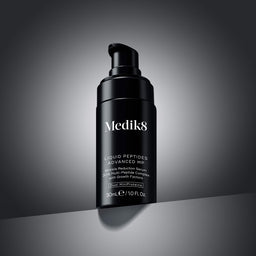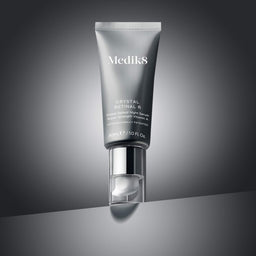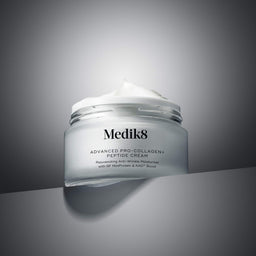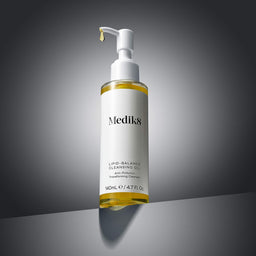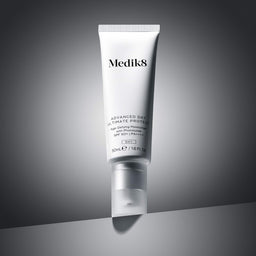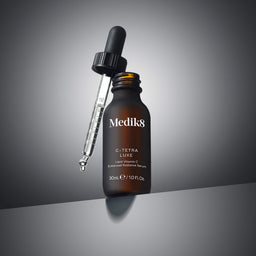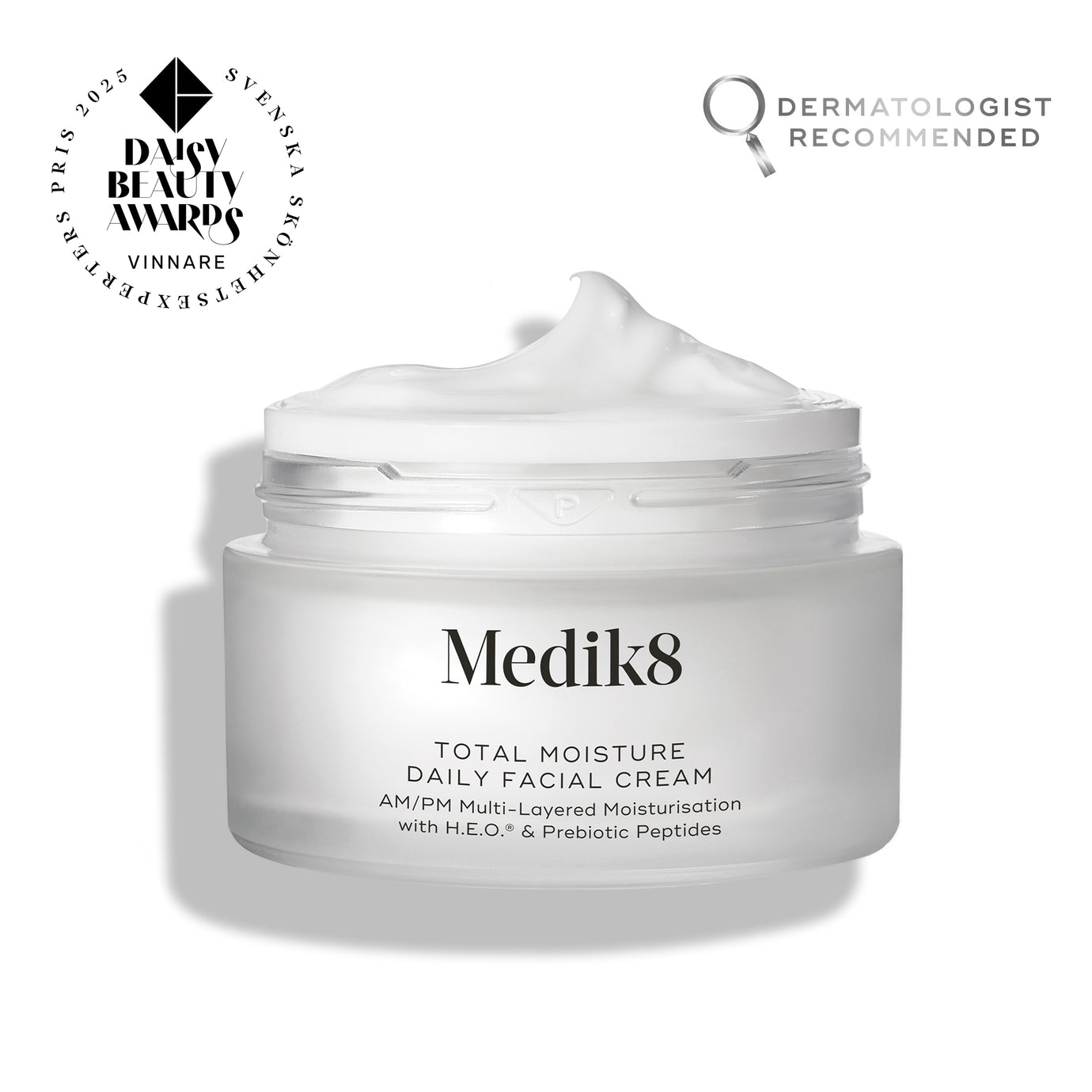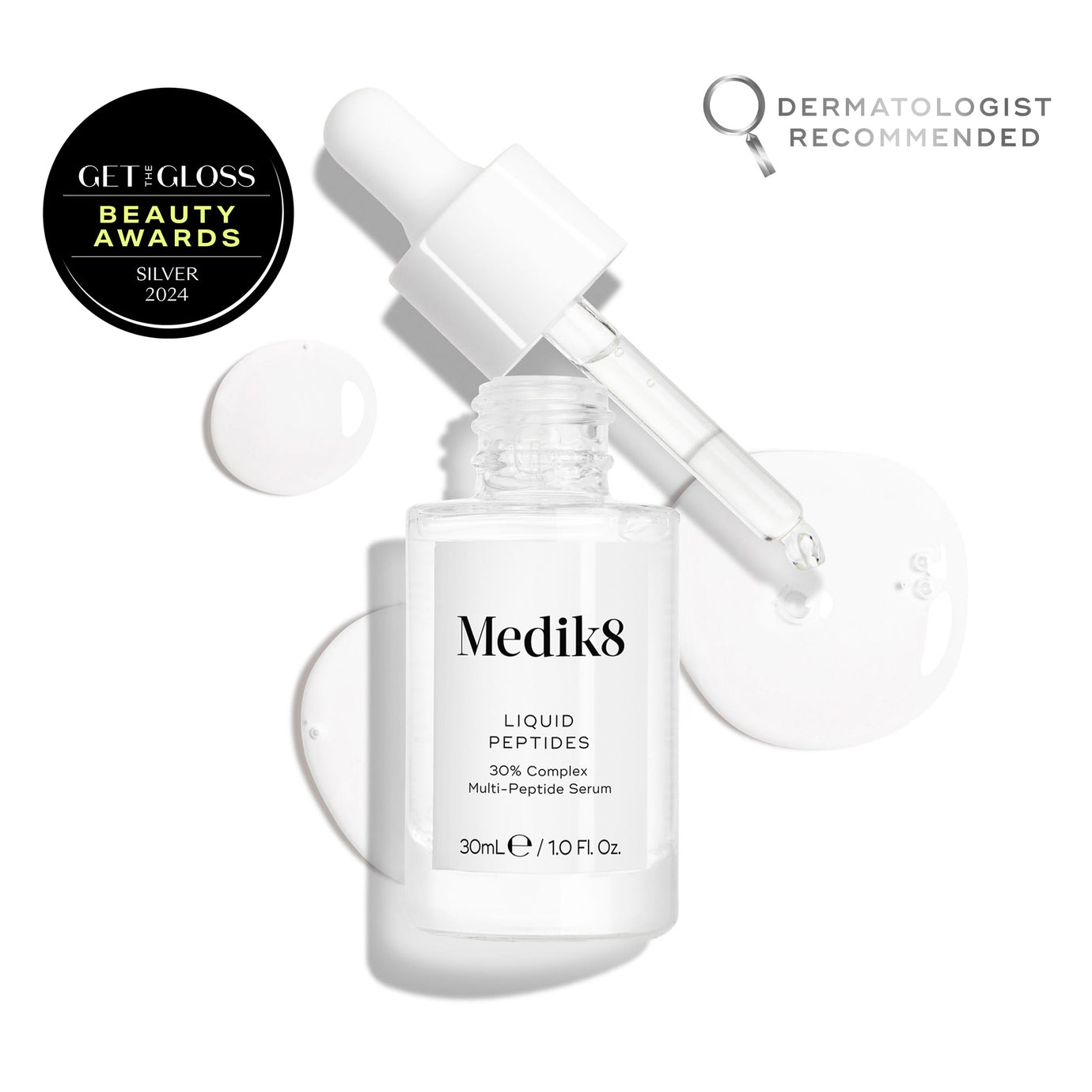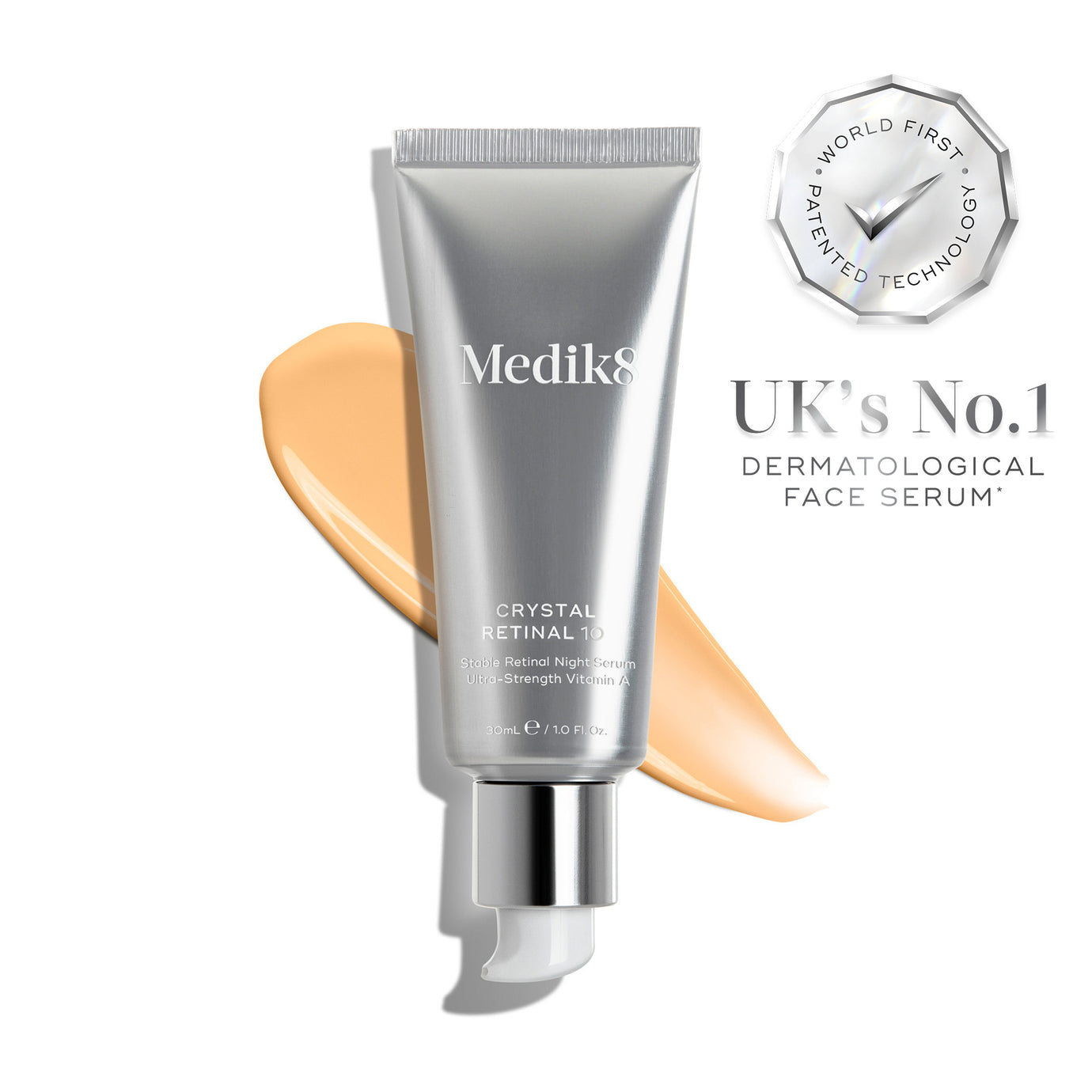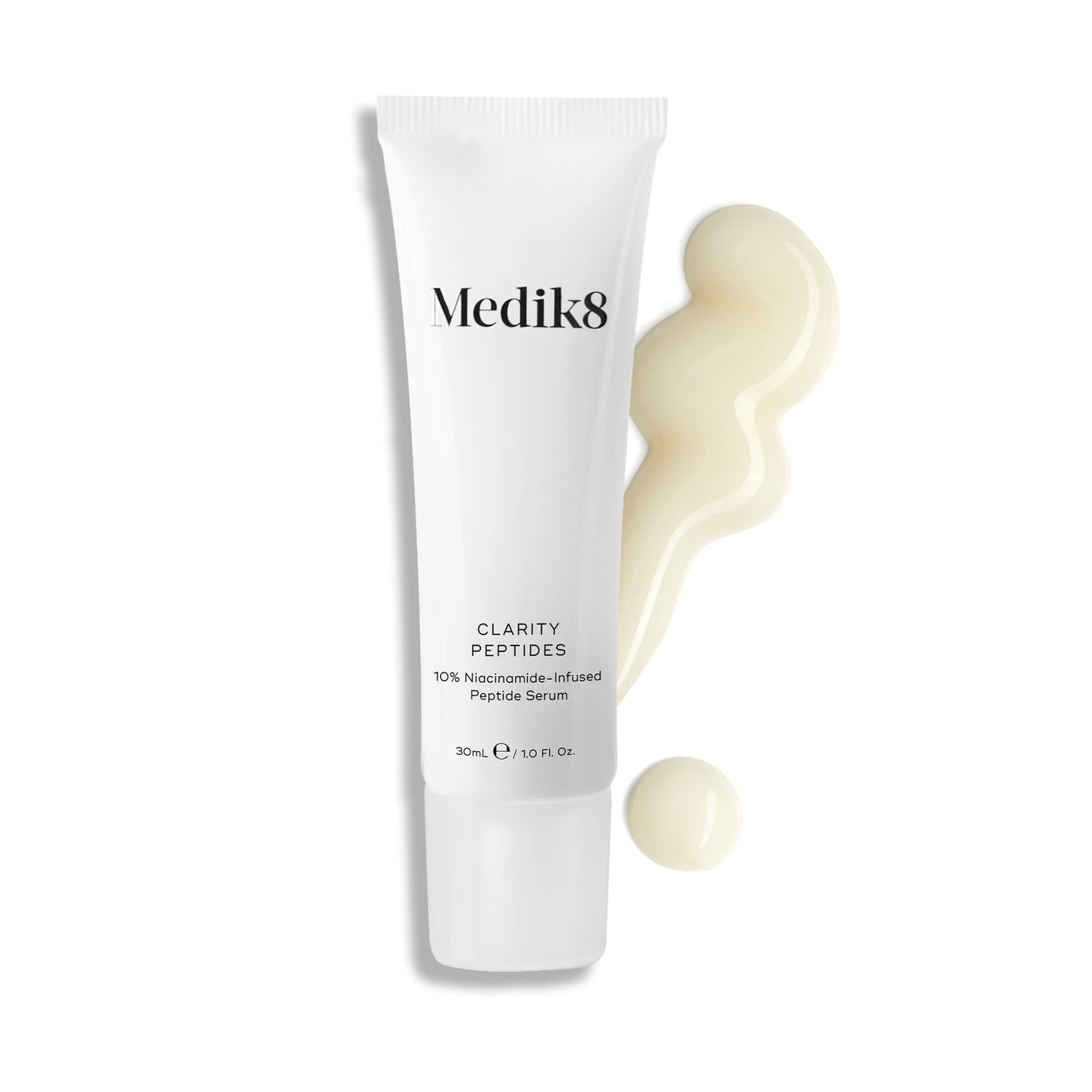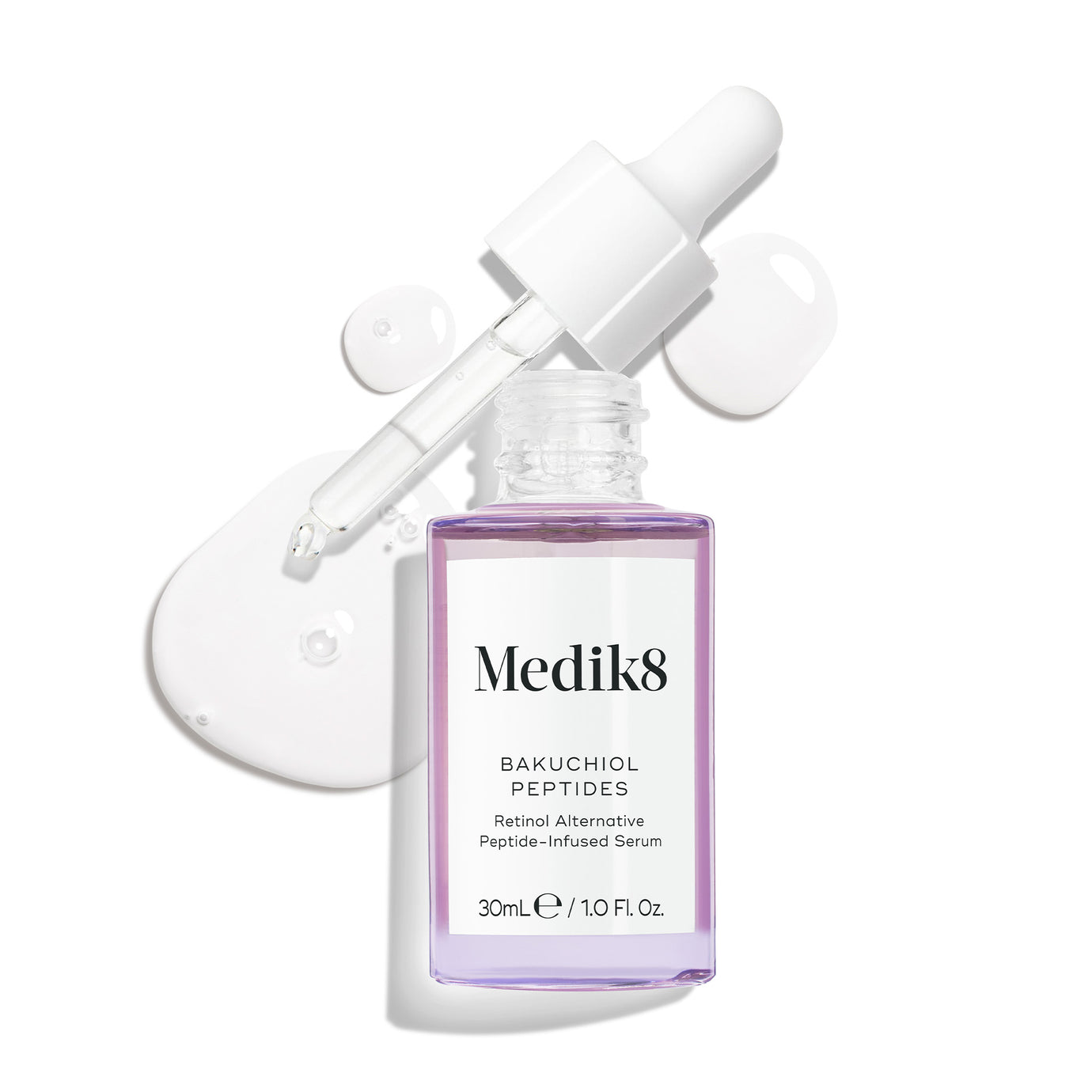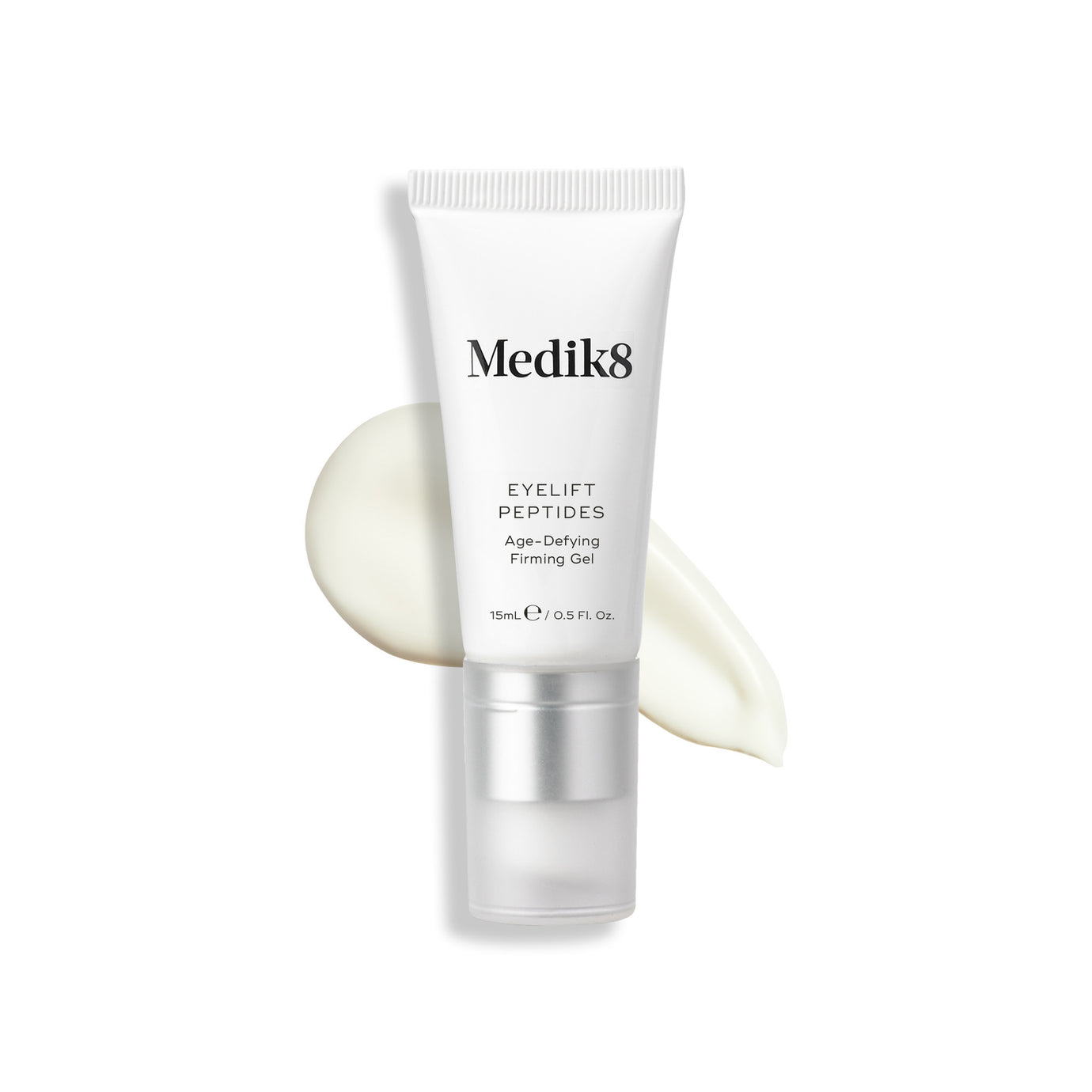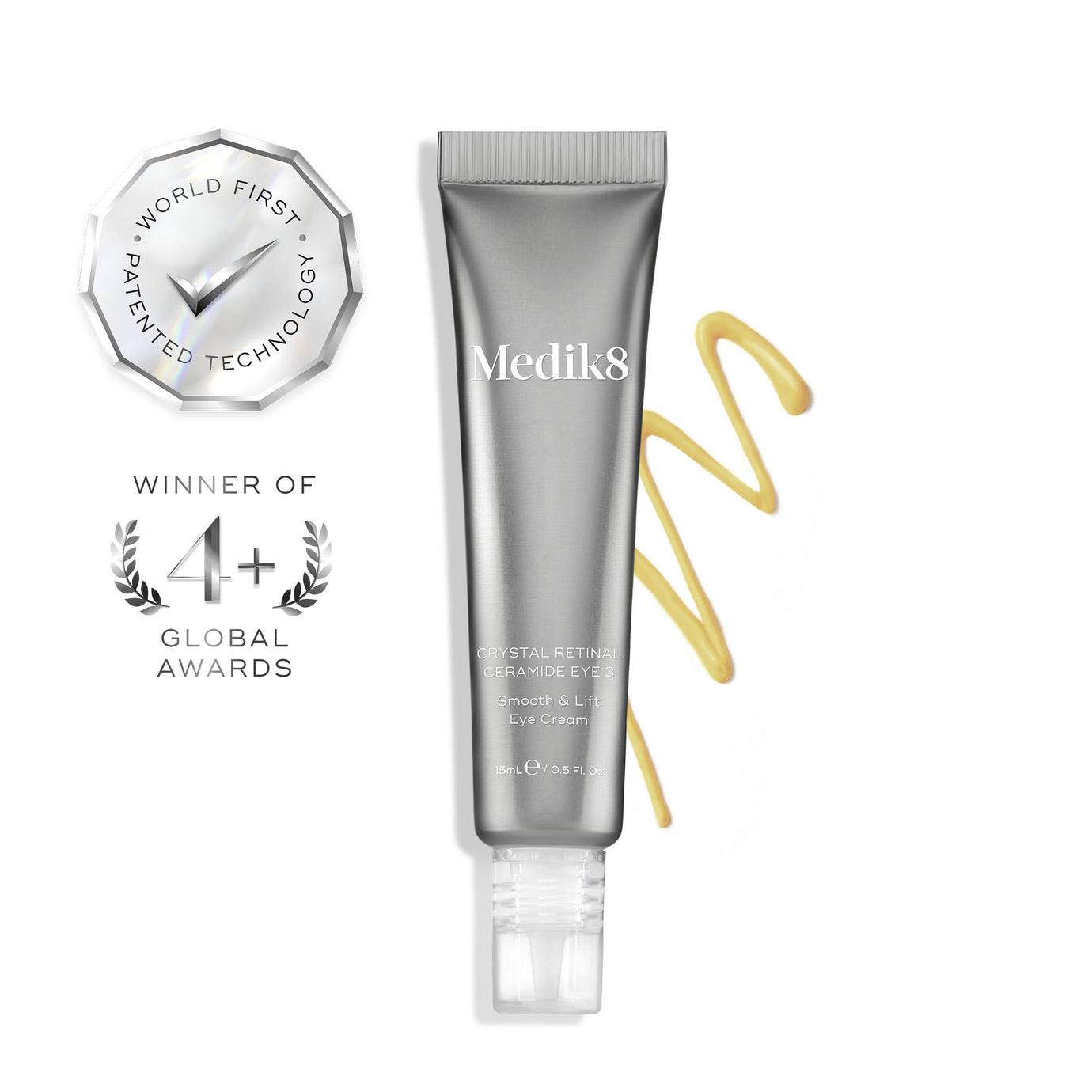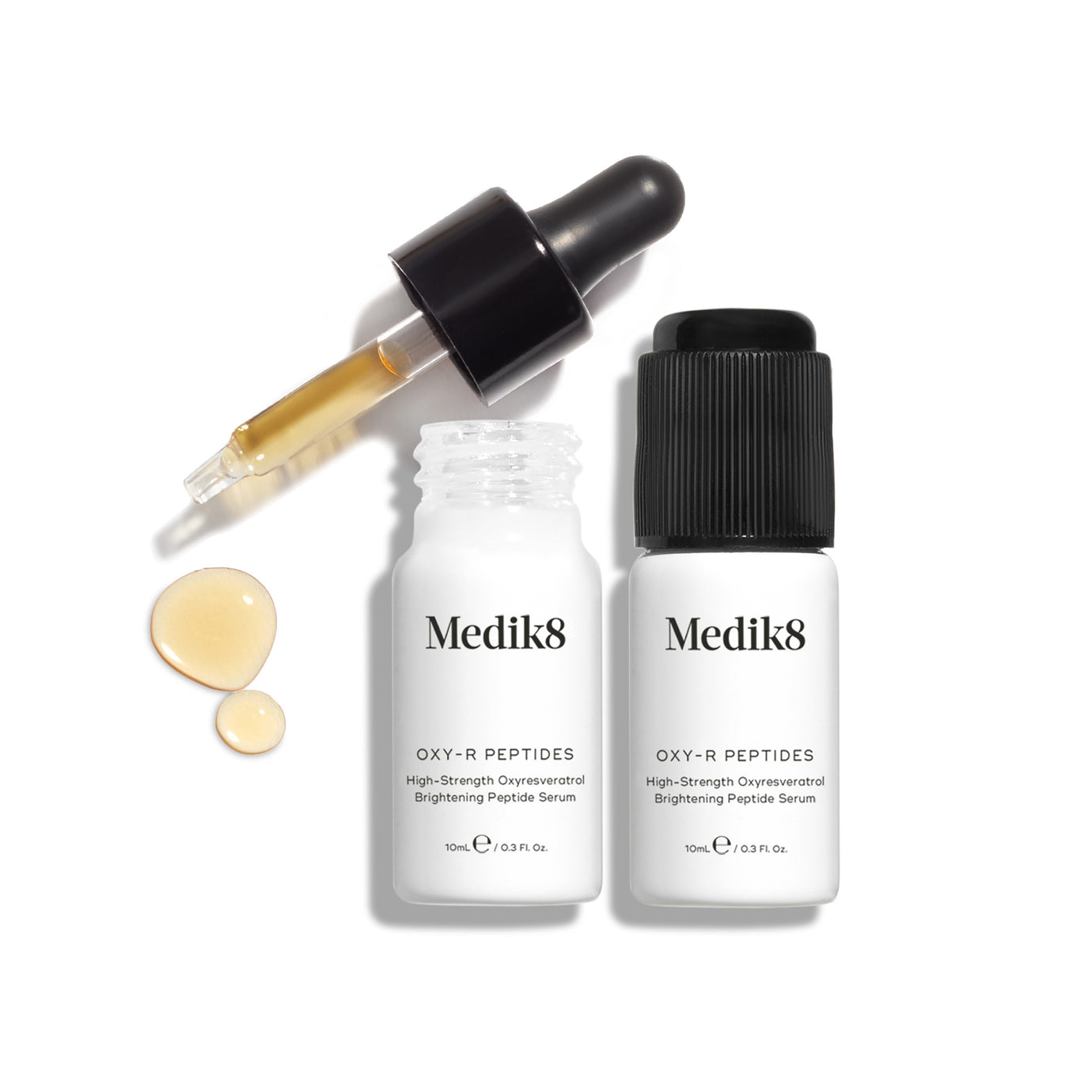Peptides vs Retinoids: Which is Better For Your Skin?
Updated: 30th July 2025
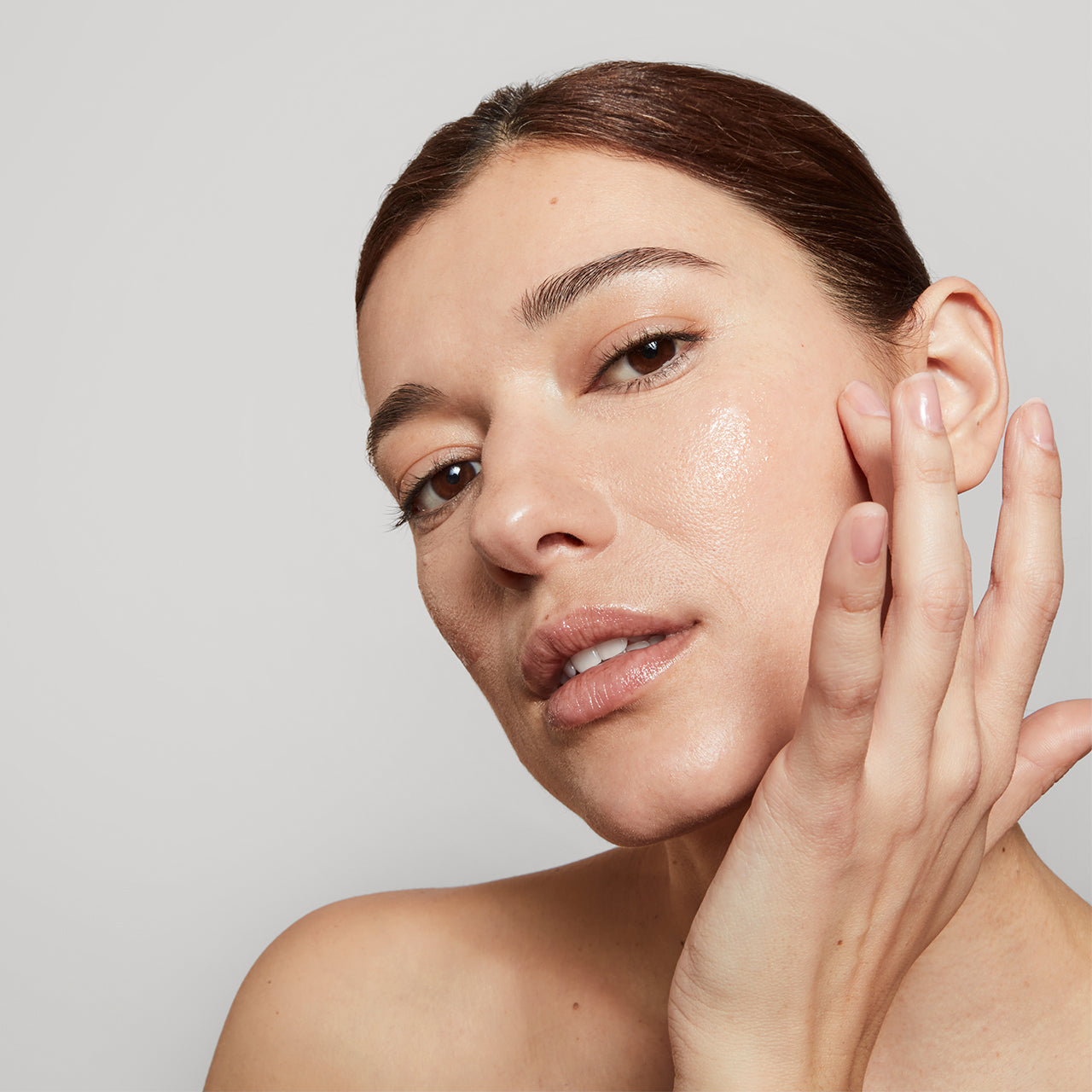
Peptides and retinoids have a lot in common. They’re both age-defying ingredients that can help to reduce the appearance of wrinkles for a visibly smoother, brighter and plumper-looking complexion. However, it’s important to note that there are a few differences between the two, which can make it difficult to decide which ingredient is best for your individual skin type and concerns.
Explore the key differences between peptides and retinoids, whether or not you can use them together and how to use them effectively for healthy, radiant and youthful-looking skin.
Understanding retinoids and peptides
Due to their advanced age-defying properties, peptides and retinoids are two highly sought-after ingredients. Here, we share the key differences between them:
Peptides vs retinoids
Although they provide the skin with similar results, peptides and retinoids can be used separately, or together to address a wide variety of skin concerns such as fine lines and wrinkles, firmness, hyperpigmentation and even blemishes.
Benefits
Skin types
At Medik8, we have a wide variety of different peptide formulations for all skin types and concerns. Mostly tolerated by all skin types, there are specific concerns that may benefit the most from their soothing, firming and clarifying properties.
Skin types best for peptides
Skin types best for retinoids
Anyone can use retinoids, just as long as you begin by using a concentration that’s low enough for your skin, especially if you are a vitamin A beginner.
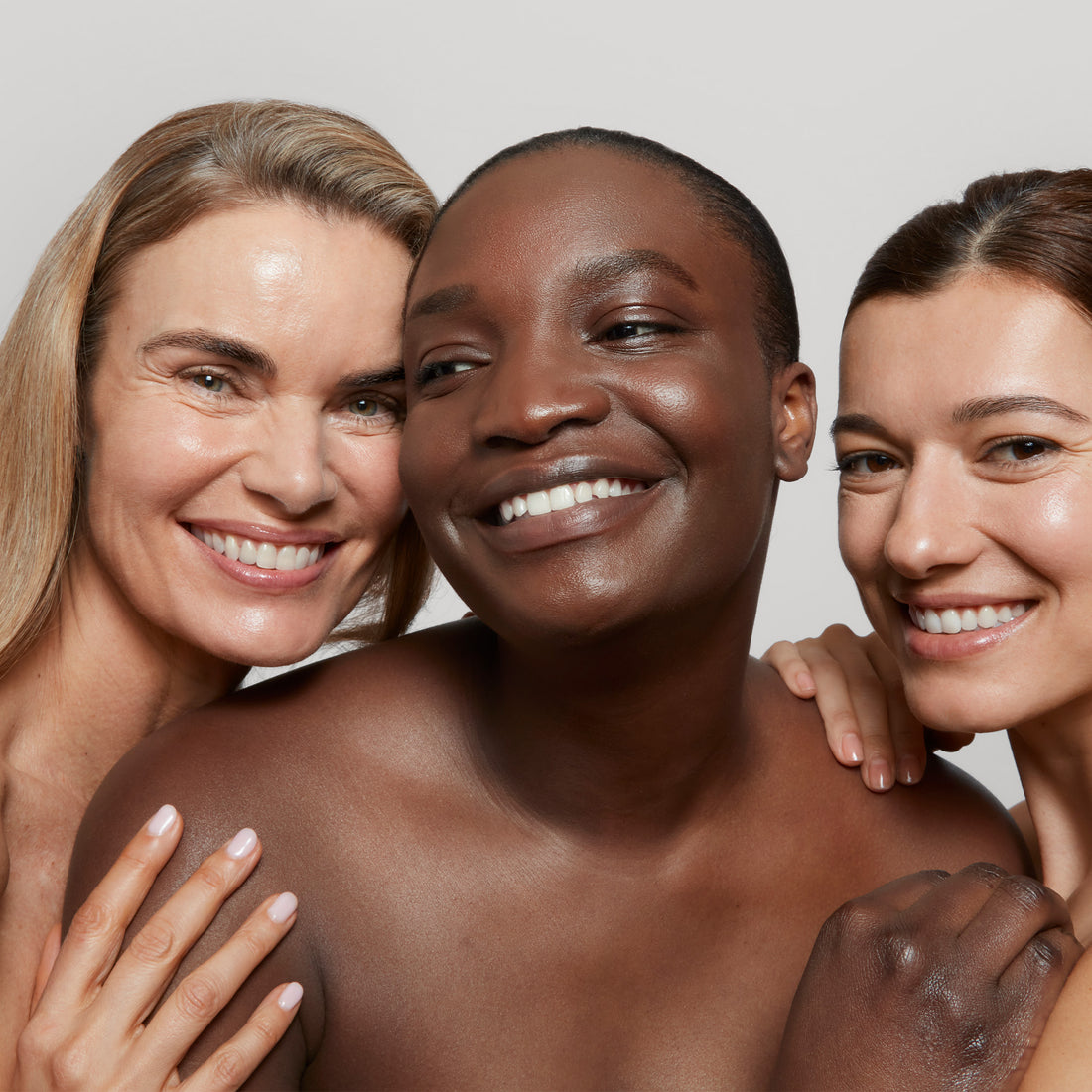
Usage
Although both ingredients provide the skin with similar visible results, they each have different application methods. For example, peptides can be used every day, up to twice a day. Whereas retinoids must only be used in your evening routine, and, if you’re a vitamin A beginner, the product needs to be gradually phased into your routine to allow your skin to become used to the molecule. The only exception to this is r-Retinoate Day & Night Serum, which combines both vitamin C and Medik8’s patented retinyl retinoate (vitamin A) in a photostable formula that won’t break down when exposed to sunlight.
So, are peptides or retinol better?
It’s clear that peptides and retinoids provide the skin with similar age-defying results. Depending on the skin goals that you want to achieve, this will determine whether you use a peptide or retinoid product. For example, if you want to help calm visible redness or inflammation, we recommend starting with a peptide product (such as Clarity Peptides) before adding vitamin A, as skin experiencing sensitivity often responds best to soothing and barrier‑supporting ingredients first.
We recommend vitamin A in the evening for most skin types, as our advanced formulations are designed for optimal results with minimal irritation, helping to target and prevent fine lines, wrinkles, dullness, and hyperpigmentation.
Can you use peptides and retinol together?
Yes, you can absolutely use peptides and retinoids together in your skincare routine. The combination of peptides and retinoids together can help you achieve a visibly smoother, brighter and more youthful-looking complexion.
Retinoids can have the potential to cause irritation and sensitivity if your skin isn’t already used to it. For this reason, if you’re a vitamin A beginner, we recommend introducing it slowly and gradually into your routine to avoid any potential irritation. Start by using it twice a week for the first 2 weeks, every other night for the next 2 weeks, then every night.
Unlike retinoids, peptides do not need to be phased into your skincare routine. At Medik8, our innovative peptide range features expertly designed peptide combinations that can be used every day, twice a day. You can use your chosen peptide serum alongside retinoids, just as long as you’re layering them in the correct order.
How to use peptides and retinol together in your skincare
Peptides and retinoids can either be used together or separately in your skincare routine. Here’s how to effectively incorporate peptides and vitamin A into your morning and evening skincare routine for visibly firmer, smoother and brighter-looking skin.

AM routine:
In the morning, use a gentle cleanser to wash away any oils or dirt that has built up on your skin overnight. We recommend a gel, foam or mousse cleanser to leave your skin feeling refreshed, revived and perfectly prepped for your morning skincare routine.
2. Direct acid/toner:
A light sweep of a direct acid or hydrating toner can help the other active ingredients in your routine to absorb deeper into the skin.
3. Peptide serum:
Depending upon whether your peptide serum is water or emulsion-based, it might be layered after your vitamin C serum. At Medik8, we always recommend applying water-based serums first, followed by oil-based serums and then emulsion-based serums. If using Copper PCA Peptides, do not apply a vitamin C serum afterwards as both products will deactivate each other’s benefits.
4. Vitamin C:
Essential to any morning skincare routine, vitamin C helps to protect your skin against any environmental damage that it is exposed to throughout the day. If using r-Retinoate Day & Night Serum, it would replace your usual vitamin C serum and be applied before sunscreen. If you have sensitive skin, we would suggest skipping the ‘direct acid/toner’ step as vitamin A already has skin-renewing properties.
5. Moisturiser and sunscreen:
Keep your skin protected against damaging UV rays and premature ageing with one of our advanced sunscreen formulations. Vitamin A can increase your skin’s sensitivity to the sun, therefore you should always apply sunscreen the following morning after using retinoids. If using Total Moisture Daily Facial Cream, make sure to apply sunscreen afterwards.

PM routine:
If wearing heavy makeup, we recommend double cleansing your skin to ensure that it is thoroughly and deeply cleansed. You can do this by using a heavier oil or cream cleanser first, followed by a lighter gel, foam or mousse cleanser to target any specific skin concerns.
2. Direct acid/toner:
This gently exfoliates the complexion and helps other actives in your routine to penetrate better into the skin.
3. Peptide serum:
Depending on whether your peptide serum is oil, water or emulsion-based, it might be layered before or after your vitamin A serum.
4. Vitamin A:
The skin is at its most active during the night, and this is the time when skin cell regeneration occurs. This therefore makes it the perfect time to use a vitamin A serum, to help to speed up the skin’s cell renewal process for a visibly smoother, firmer and more youthful-looking complexion.
5. Moisturiser:
Nighttime is the optimal time to use a more nourishing, heavier moisturiser. Our bestselling Advanced Night Restore is a deeply nourishing cream infused with a skin-firming multi-ceramide complex to support fuller, smoother and more youthful-looking skin.
Take our personalised Regime Builder and build your very own bespoke skincare routine.
NOTE: At Medik8, we recommend not to pair vitamin A with bakuchiol in the same routine. Both ingredients provide the skin with similar results, therefore, using them together could potentially cause the skin to become irritated and sensitive. If you can use vitamin A, then use it. We suggest only using bakuchiol if you’re intolerant to vitamin A or you are pregnant and/or breastfeeding.
Using peptides and retinol for skin concerns
At Medik8, we recommend using both peptides and retinoids as part of your age-defying skincare routine. Peptides can be used as ‘CSA Enhancers’ to complement your already existing CSA regime and target stubborn skin concerns like dryness, hyperpigmentation and blemishes.
From blemishes to fine lines and wrinkles and dark spots, below we have created a handy guide on when you should be using peptides and/or retinoids in your skincare routine for optimal results.
For hydration:
Peptides
For blemishes: Peptides + retinoids
For fine lines and wrinkles: Peptides + retinoids
For signs of ageing around the eyes: Peptides + Retinoids
For dark spots and hyperpigmentation:
Peptides + retinoids
For sensitive or compromised skin: Peptides
In conclusion
It is clear that peptides and retinoids are both powerful ingredients that can help address the visible signs of ageing such as fine lines and wrinkles, dark spots, hyperpigmentation and dullness.
Whether you choose to use peptides, retinal or both, it is important that you are consistent with the application and you apply them in the correct order to achieve optimal visible results. Peptides can be used every day, twice a day; whereas retinoids can only be used in the evening (except for r-Retinoate Day & Night Serum). There’s also no need to phase peptides into your routine, whereas if you’re a vitamin A beginner, we always recommend that you introduce the molecule to your skin slowly by using it twice a week for the first 2 weeks, every other night for the next 2 weeks, then every night.
FAQ's
Peptides and retinoids are both powerful age-defying ingredients that can either be used together or separately in your routine. As the Experts in Vitamin A, we always recommend using retinoids as part of our groundbreaking CSA Philosophy for healthy, radiant and youthful-looking skin.
At Medik8, all of our innovative peptide products have been expertly formulated to be used alongside all of our age-defying formulas. The only exception to this is Copper PCA Peptides, which should not be used alongside another vitamin C product as they will deactivate one another’s visible effects on the skin.
Both ingredients help to address the appearance of common signs of skin ageing such as fine lines, wrinkles and hyperpigmentation. At Medik8, we always recommend using vitamin A in your evening routine as part of our clinically proven CSA Philosophy for a visibly firmer, smoother and brighter-looking complexion. Once you have built your CSA regime, you can begin to incorporate peptides into your routine to help target any specific skin concerns.
Peptides can be used every day, up to twice a day. Whereas vitamin A must only be applied in your evening skincare routine (except r-Retinoate Day & Night Serum). In your evening skincare routine, you would apply your chosen peptide serum after cleansing and toning, followed by vitamin A and moisturiser.
Both ingredients can be used either together or separately to help reduce the appearance of wrinkles. However, if you were to choose just one ingredient, we always recommend everyone use vitamin A for faster visible youth-renewing results.
Yes, you can use Copper PCA Peptides with vitamin A in your evening skincare routine to help neutralise skin-damaging free radicals that may have accumulated on your skin throughout the day. Copper PCA Peptides would be applied after cleansing, followed by your vitamin A and finally moisturiser.
At Medik8, we always recommend that everyone should use vitamin A in their skincare routine for remarkable youth-renewing results. An essential part of our CSA Philosophy, our cutting-edge vitamin A range offers a variety of retinol and retinal formulas in expertly stabilised strengths to suit all skin types and needs.
Peptides can be used as a ‘CSA Enhancer’ in your evening routine alongside vitamin A for a visibly firmer, smoother and brighter-looking complexion.
[1]Results from 3rd party independent tests assessing antioxidant performance
[2]G. Siegenthaler et al., Retinol and retinal metabolism, Biochemical Journal, 1990, 268, pp 371-378
[3]Proven via independent clinical study on Total Moisture Daily Facial Cream on 33 volunteers over 2 weeks
[4]Proven via independent clinical study on Crystal Retinal 6. Tested on 33 participants over 12 weeks.
[5]Proven via an Independent consumer study conducted over 4 weeks on 50 participants with discolouration skin concerns
